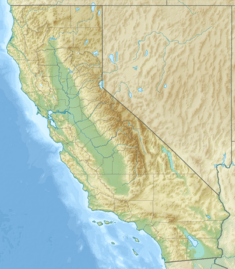Success Dam facts for kids
Quick facts for kids Success Dam |
|
|---|---|
|
Location of Success Dam in California
|
|
| Country | United States |
| Location | Porterville, California |
| Coordinates | 36°03′38″N 118°55′09″W / 36.06056°N 118.91917°W |
| Construction began | 1958 |
| Opening date | 1961 |
| Dam and spillways | |
| Type of dam | Embankment |
| Impounds | Tule River |
| Height | 156 ft (48 m) |
| Length | 3,490 ft (1,060 m) |
| Elevation at crest | 652.5 ft (198.9 m) |
| Dam volume | 5,560,000 cu yd (4,250,000 m3) |
| Reservoir | |
| Creates | Lake Success |
| Total capacity | 82,300 acre⋅ft (101,500,000 m3) |
| Catchment area | 393 sq mi (1,020 km2) |
| Surface area | 2,450 acres (990 ha) |
The Success Dam is a large structure built across the Tule River in Tulare County, California, in the United States. Its main jobs are to control floods and help with irrigation for farms.
This dam is an earthen embankment type. This means it's made mostly from compacted earth and rock. It stands about 156 feet (48 m) tall and stretches 3,490 feet (1,060 m) long. The dam is located about 5 miles (8.0 km) east of Porterville. It holds back the river's water to create Lake Success, which can hold a lot of water – about 82,300 acre-feet (0.1015 km3).
Building the Dam
The idea for Success Dam came from the Flood Control Act of 1944. This act planned a big system of dams and walls to protect the Tulare Lake area from floods. This area is in the southern part of the San Joaquin Valley.
The U.S. Army Corps of Engineers (USACE) was in charge of building the dam. They started construction in 1958. The dam was finished in 1961. It was officially opened on May 18, 1962.
Keeping the Dam Safe
In 1999, the USACE studied the dam's foundation. They found that the soil and rock layers, called alluvial deposits, under the dam were not as strong as needed. This meant the dam might not be safe if a strong earthquake happened.
Because of this, new rules were made in 2006. These rules limited how much water could be stored in Lake Success. The lake's capacity was reduced to 28,800 acre-feet (0.0355 km3). This is only about 35% of its full capacity.
There is a plan to make the dam stronger. This project would cost about $500 million. It would make the dam 350 feet (110 m) thicker. This extra thickness would help the dam withstand earthquakes better.
 | Mary Eliza Mahoney |
 | Susie King Taylor |
 | Ida Gray |
 | Eliza Ann Grier |


